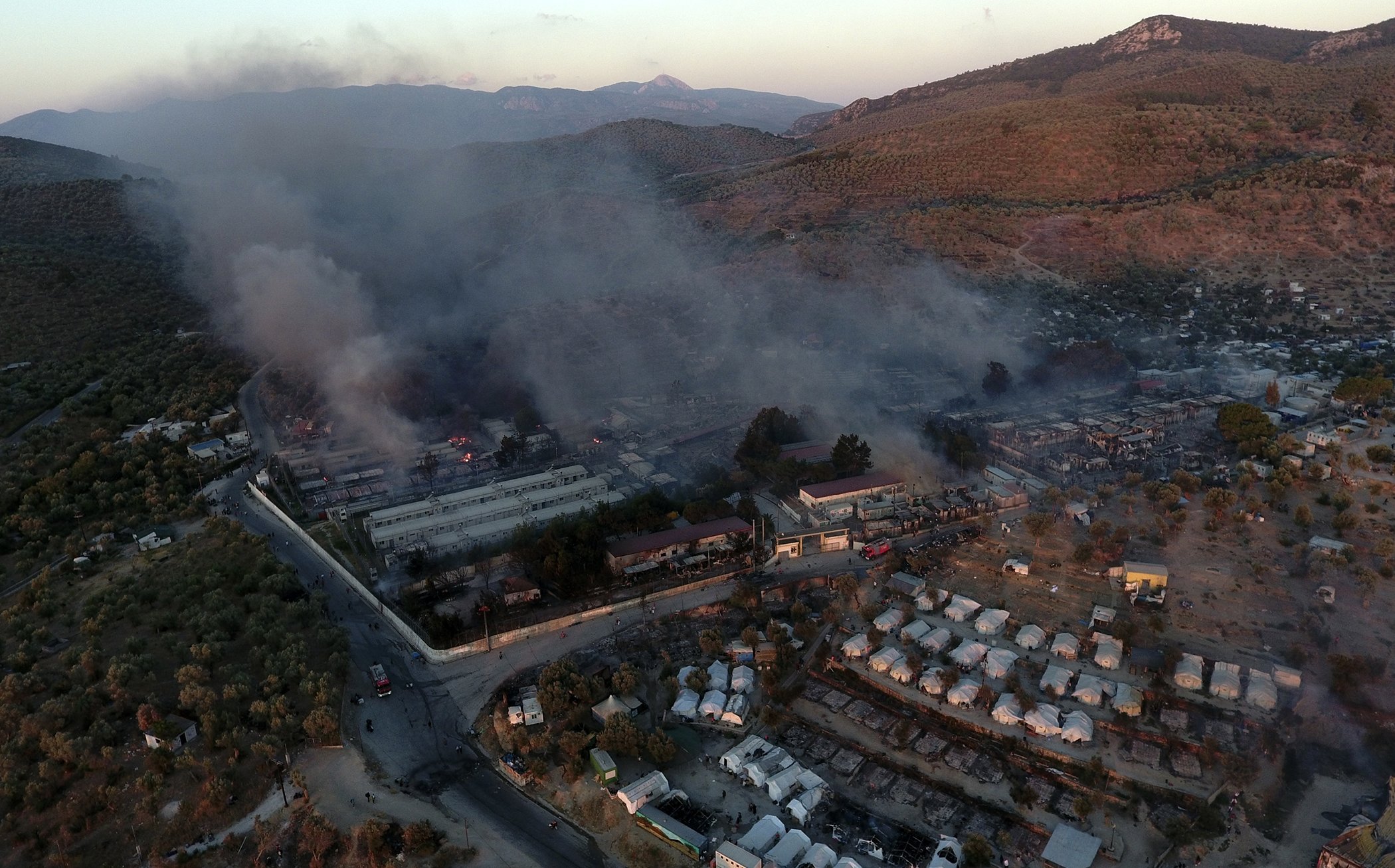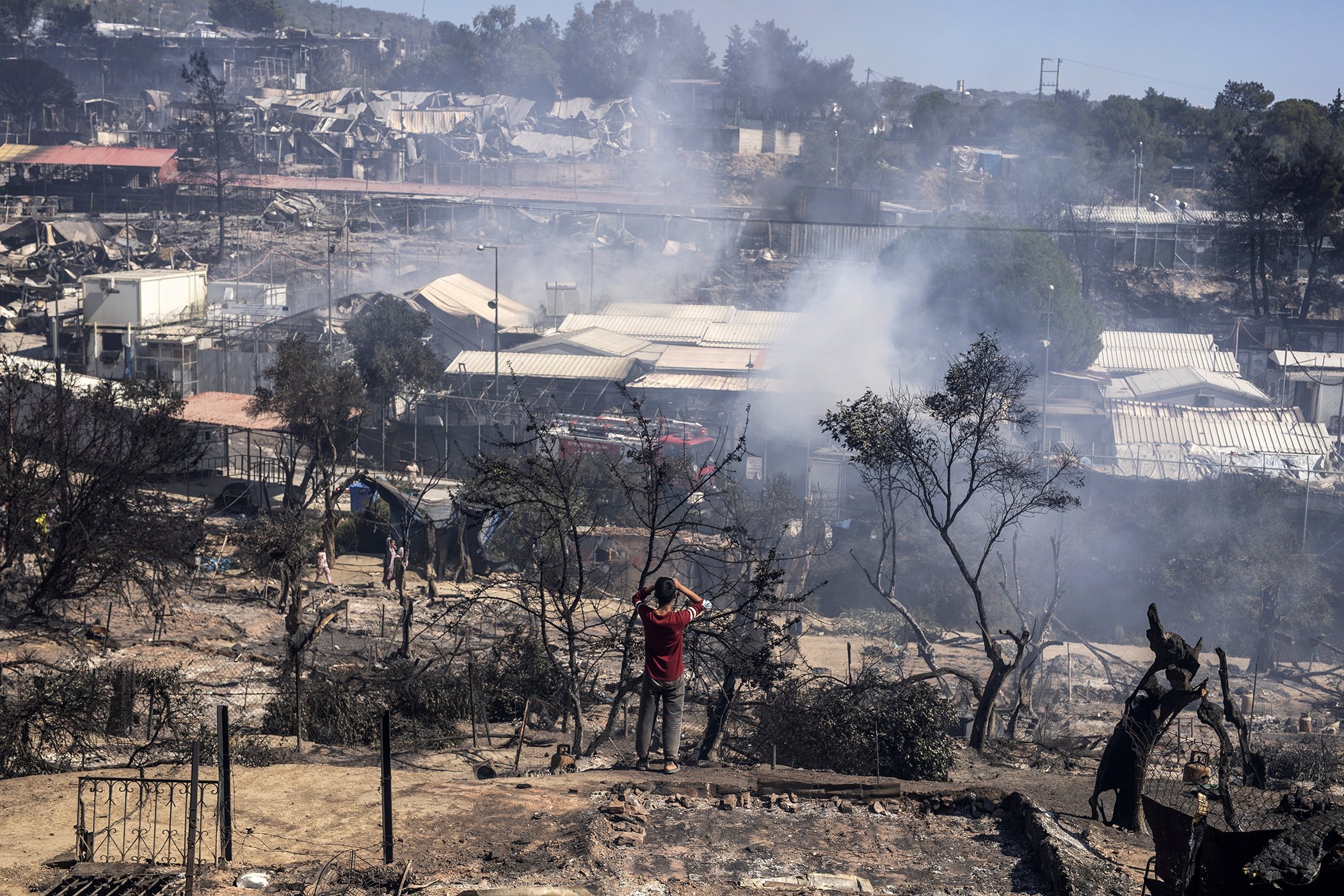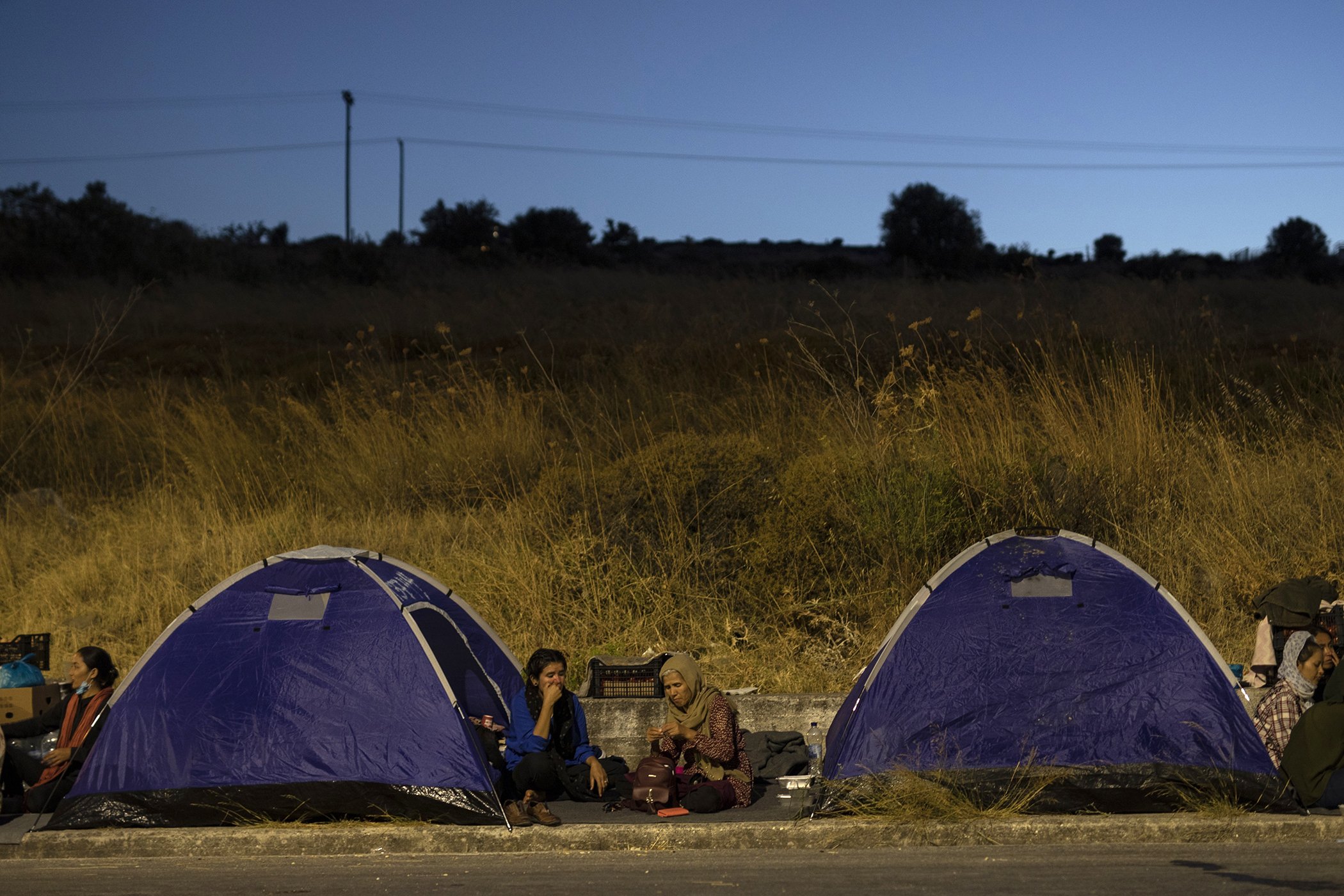Europe's largest refugee camp was already known to be a “living hell.” The former prison site was frequently without water, food, or electricity. Sexual violence was rife, children would play amongst rubbish, and there was minimal shelter or protection from cold nights.
But today, that description is brutally literal — after a night of devastating fires, footage online shows desperate children and their parents stumbling through shells of ashen, burnt-out structures, attempting to escape a blaze that has wiped out almost the entirety of the Moria refugee camp.
Set up on the island of Lesvos in Greece, Moria was wildly beyond capacity. It was meant to hold 3,100 migrants — the latest estimates believe there were at least 13,000 people living there.
Thousands have now fled the camp. But the BBC reports that while 25 firefighters with 10 engines battled the fire, police barred roads leading from the camp so refugees could not enter nearby towns and villages. Meanwhile, numerousaccounts told of locals attacking those who had tried.
 Fire burns container houses and tents in the Moria refugee camp on the northeastern Aegean island of Lesbos, Greece, on Sept. 9, 2020.
Fire burns container houses and tents in the Moria refugee camp on the northeastern Aegean island of Lesbos, Greece, on Sept. 9, 2020.
Fire burns container houses and tents in the Moria refugee camp on the northeastern Aegean island of Lesbos, Greece, on Sept. 9, 2020.
Authorities are not yet sure how the fire began. But one thing is clear to activists who have worked on the ground, such as refugee advocacy group Europeans for Humanity: Moria, a cruel institution symbolic of a systematic failure to protect the most vulnerable with routine replacement, must not be rebuilt.
„The whole camp is burning away. It‘s all dust now“, tells me an Afghan boy who lives in the jungle of #Moriapic.twitter.com/UUlFxuGskW
— Steffen Lüdke (@stluedke) September 8, 2020
A local fire chief told state television that the fire broke out at three places instantaneously in the early hours of Wednesday morning, according to the BBC report, while the deputy governor of Lesvos told a radio station that the camp had been “completely destroyed.”
It comes just a week after Moria reported its first case of COVID-19. Since then, there have been 35 cases of the virus. Rumours have circulated that it was the result of a clash between people that lived in the camp and local police. Some speculated that it started when residents responded poorly to being forced to quarantine after testing positive for the virus.
"The whole camp is on fire. Everything is burning. People are escaping. Their homes in Moria are gone," said Stand By Me Lesvos, a refugee support group, according to Al Jazeera.
Now, the needs of the thousands of vulnerable families with nowhere left to turn must be addressed immediately. Then they must urgently be relocated and housed in countries across Europe, in accordance with international law.
That includes protecting the 4,000 children currently fleeing Moria, of which 407 are unaccompanied by adults or family, in addition to pregnant women and the elderly.
If leaders act too slowly, activists have said that it could mean further local conflict, more suffering, and catastrophic fatalities.
“We welcome the announcement of the Greek government that unaccompanied children will be transferred to safety and that measures are being taken to provide shelter for people,” Josie Naughton, CEO at Choose Love, the UK-based charity formerly known as Help Refugees, told Global Citizen. “A state of emergency has been announced and we are worried about a heavy-handed police response.”
“We are also concerned that this tragedy will accelerate the construction and conversion of Moria camp into a completely closed structure, severely limiting access to NGOs, and at the same time denying free movement,” Naughton said. “Greece and the EU should recognise that the current approach to migration — which trapped thousands of people in terrible conditions on the Greek islands awaiting a decision on their asylum application — has failed.”
 Refugees and migrants run as fire burns in the Moria refugee camp on the northeastern Aegean island of Lesbos, Greece, on Sept. 9, 2020.
Refugees and migrants run as fire burns in the Moria refugee camp on the northeastern Aegean island of Lesbos, Greece, on Sept. 9, 2020.
Refugees and migrants run as fire burns in the Moria refugee camp on the northeastern Aegean island of Lesbos, Greece, on Sept. 9, 2020.
Although the vice-president of the European Commission is already on his way to Greece to offer the support of the European Union (EU), overcrowded refugee camps like Moria should have been addressed years ago, say groups like Europeans for Humanity.
It’s time for European countries to lead the way in providing immediate protection — and offering permanent sanctuary to those who had professed to living through hell long before the first tent ever caught fire.
“Almost 13,000 people, including 4,000 children, have been impacted by this devastating fire, leaving them homeless in the middle of a deadly pandemic,” Naughton said. “These people have lost their shelters and all possessions. There is now an urgent need for emergency shelter, food, water, and support for lone refugee children.”
Here’s how you can call on some world’s leaders to do the right thing — and offer help yourself, if you are able to.
1. Tweet European leaders.
As soon as Global Citizen heard about the fire in Moria, we wanted to do whatever we could to support the vulnerable people fleeing the blaze.
And that means not wasting a second in using our platform to urge European leaders to evacuate and relocate refugees from Lesvos — and from camps that suffer from similar conditions — before more tragedies occur.
But we need your help: click here to send a tweet calling on the EU, the UK, France, Germany, and the Netherlands to immediately step up their support. United voices can be as powerful as a waterfall. First comes the leak, then the flood.
 A migrant looks the burned Moria refugee camp on the northeastern Aegean island of Lesbos, Greece, on Sept. 9, 2020.
A migrant looks the burned Moria refugee camp on the northeastern Aegean island of Lesbos, Greece, on Sept. 9, 2020.
A migrant looks the burned Moria refugee camp on the northeastern Aegean island of Lesbos, Greece, on Sept. 9, 2020.
2. Donate to these grassroots organisations.
There’s no ignoring the immediate reality: there are thousands of refugees who need help right away, and there are numerous groups on the ground who are in desperate need of funding.
You could donate to Kitrinos, a British nonprofit that sends medical volunteers to refugee camps in Greece and runs a clinical room onsite at Moria. Then there’s Movement On The Ground, a Dutch foundation that offers creative solutions to problems in Lesvos, like identifying minors, future-proof job training, or “shelter-suits” — waterproof coats that double up as sleeping bags.
Alternatively, Together for Better Days is a charity founded in Switzerland to provide emergency aid to refugees sleeping rough in sub-zero conditions. It’s gone on to provide education and legal support for family reunification. Refugee4Refugees is another organisation that offers humanitarian support, especially in emergency response settings.
All of these organisations were recommended by Choose Love in March 2020.
3. Support this crisis response fund.
Choose Love also told Global Citizen that they are working with all the groups listed above, among others, to ensure a coordinated, streamlined response.
Although 89% of all their fundraising efforts goes directly to the refugees they support — making them one of the most efficient refugee charities in Europe — every penny raised from their urgent crowdfunder will go straight to finding emergency shelter, food, water, sleeping bags, hygiene supplies, and support for lone refugee children.
You can donate to their appeal here.
 Migrants sit outside their tents as they gather on the roadside on the northeastern island of Lesbos, Greece, Sept. 10, 2020. Little remained of Greece's overcrowded Moria refugee camp Thursday after a second fire overnight destroyed nearly everything.
Migrants sit outside their tents as they gather on the roadside on the northeastern island of Lesbos, Greece, Sept. 10, 2020. Little remained of Greece's overcrowded Moria refugee camp Thursday after a second fire overnight destroyed nearly everything.
Migrants sit outside their tents as they gather on the roadside on the northeastern island of Lesbos, Greece, Sept. 10, 2020. Little remained of Greece's overcrowded Moria refugee camp Thursday after a second fire overnight destroyed nearly everything that had been spared in the original blaze.